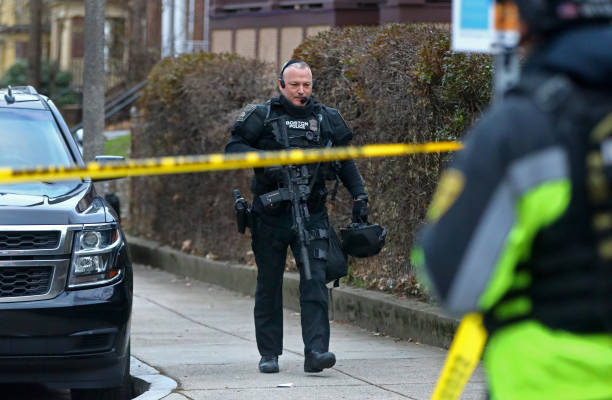Gun violence in Boston is a problem that has long been concentrated in specific neighborhoods, disproportionately affecting Black and Latinx communities. According to data from the Boston Police Department, the neighborhoods of Roxbury, Dorchester, and Mattapan are among the most affected by gun violence, with high rates of poverty, unemployment, and gang activity.
The impact of gun violence on these neighborhoods is devastating, with families and communities left reeling from the trauma. Children who grow up in these neighborhoods may be exposed to violence from a young age, leading to long-term effects on their mental health and wellbeing. And the trauma of losing loved ones to gun violence is compounded by the fact that many of these shootings go unsolved.
One reason for the concentration of gun violence in these neighborhoods is the availability of illegal firearms. Many gang members carry guns for protection, and firearms are often smuggled into the city from neighboring states with looser gun laws. But the root causes of violence in these communities are complex and multifaceted, shaped by a legacy of systemic racism and inequality.
As in many cities across the United States, the legacy of racist policies and practices has created stark racial disparities in Boston. Redlining, discriminatory lending practices, and other forms of institutional racism have contributed to the concentration of poverty and disinvestment in Black and Latinx communities. The lack of economic opportunity and resources in these neighborhoods, combined with a history of over-policing and criminalization, has fueled a cycle of violence that is difficult to break.
Efforts to address gun violence in Boston have included both law enforcement measures and community-based initiatives. Police have increased patrols in high-crime areas and targeted investigations, while community organizations have provided services and support to residents affected by violence. The Boston Police Department has also launched a program aimed at engaging young people and steering them away from gangs and gun violence.
One such initiative is the Boston Gun Project, which has had success in reducing gun violence by using a data-driven approach to identify and support individuals and groups most likely to be involved in gun violence. The program has also focused on collaboration between law enforcement and community organizations, recognizing that building trust and relationships is essential to reducing violence.
However, there are limitations to relying on law enforcement measures alone to address the root causes of gun violence in these neighborhoods. Critics argue that aggressive policing can further exacerbate distrust and hostility between police and community members, making it more difficult to build the kind of relationships that are necessary to reduce violence. Some have called for a shift towards more community-led initiatives, such as investing in education and economic development in these neighborhoods.

Community organizations have also taken a proactive approach in addressing the issue. One such initiative is the Boston Gun Project, which has achieved notable success in reducing gun violence through a data-driven approach to identify and support individuals and groups most likely to be involved in gun violence.
Despite these efforts, more work needs to be done to address the underlying factors contributing to the culture of violence in these neighborhoods. The combination of poverty, unemployment, and gang activity creates a complex challenge that requires a multi-pronged approach.
To address the issue of gun violence in Boston, community organizations have taken a proactive approach. One such organization is the Boston TenPoint Coalition, a faith-based organization that works to reduce violence in the city. The Boston TenPoint Coalition works to provide support and resources to families and communities affected by gun violence, while also advocating for policies that address the root causes of violence in these neighborhoods.
Another organization that has been working to address the issue of gun violence in Boston is the Boston Peacekeepers. The Boston Peacekeepers is a group of former gang members who now work to prevent violence in their communities. The organization works to mediate conflicts between gangs and provide support to young people who are at risk of becoming involved in violence.
In addition to community-based initiatives, there is also a need for policy changes to address the issue of gun violence in Boston. One area that policymakers can address is the issue of gun trafficking. Many of the illegal firearms used in violent crimes in Boston are smuggled into the city from neighboring states with looser gun laws.
As evidenced by the data, gun violence in Boston is disproportionately affecting certain neighborhoods with high rates of poverty, unemployment, and gang activity. It is clear that addressing this issue will require a multifaceted approach that goes beyond just increasing law enforcement measures.
While initiatives like the Boston Gun Project have shown promising results in reducing gun violence, more needs to be done to address the underlying issues of poverty, unemployment, and systemic racism that contribute to the culture of violence in these neighborhoods.
It is also important to acknowledge the racial disparities at play in this issue. The fact that these neighborhoods are predominantly Black and Latinx highlights the systemic racism and inequality that exists in the city.